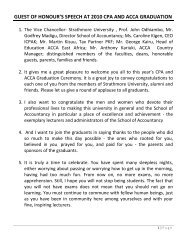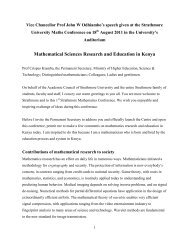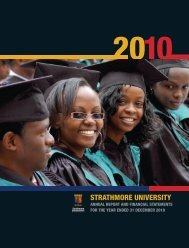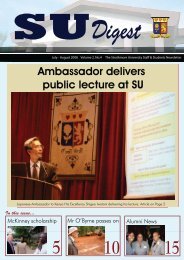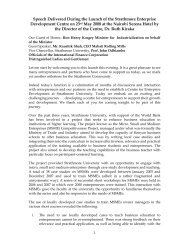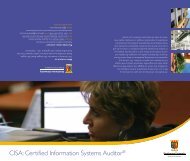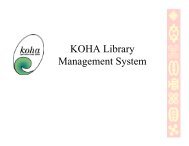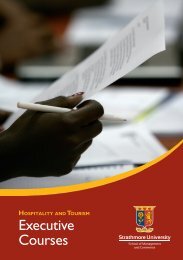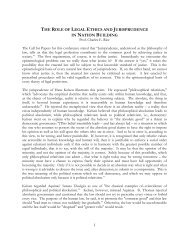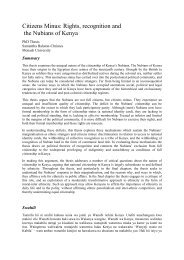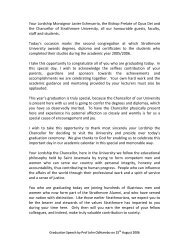Course outline template - Strathmore University
Course outline template - Strathmore University
Course outline template - Strathmore University
- No tags were found...
You also want an ePaper? Increase the reach of your titles
YUMPU automatically turns print PDFs into web optimized ePapers that Google loves.
COURSE OUTLINE<br />
SEPTEMBER 2011
<strong>Course</strong> Outline Template<br />
The completion of this <strong>template</strong> should follow the prescribed layout. All sections must be<br />
completed.<br />
Module Code: The code should comprise the School/Centre/<strong>Course</strong> prefix followed by four<br />
digits, the first for module level and the remaining three for general identification purposes.<br />
Each code should be unique and should not repeat a previously-used one. A module may be<br />
offered at one level only. If the same module is offered at two levels, it will be seen as two<br />
different modules and will require two different codes. Each of these modules will have different<br />
learning outcomes that imply different assessment criteria, guided by the level description, even<br />
when the teaching content is the same.<br />
Module Title: The title should be that adopted in official publications; the title will also appear<br />
on a student’s transcript. In the latter context, it should be noted that only 8 characters can be<br />
accommodated on <strong>University</strong> transcripts; you may wish to formulate the title accordingly.<br />
Lecturer: List the lecturer(s) involved identifying, where more than one is involved, the module<br />
director/coordinator.<br />
Credit Value/Contact hours: Please observe the <strong>University</strong> framework for credit/contact hour<br />
allocation. Note in particular the convention that one credit is notionally equivalent to 15 contact<br />
hours of teaching/learning/assessment.<br />
Level: Please observe the <strong>University</strong> framework for level allocation. Note that level should relate<br />
to learning outcomes appropriate to the stage of a student’s programme.<br />
Pre-requisites: Indicate any prior qualification or experience (e.g. previous modules, or<br />
equivalent) that is required.<br />
Co-requisites: Indicate any co-requisites.<br />
Duration of Module: Indicate the length of the module, e.g. first semester, number of<br />
weeks/days, number of hours, and its starting date in the academic year.
Total Student Study Time: Indicate the anticipated study time, including separate reference to<br />
contact hours, associated private study time and time taken in assessment tasks.<br />
Aims: What are the aims/what is the rationale of the module<br />
Intended Learning Outcomes: These should be written in the form of statements of what<br />
students should have achieved by the end of the module. They should refer to (a) subject-specific<br />
skills; (b) core academic skills; (c) personal and generic skills.<br />
(a) Subject-specific skills: The skills and knowledge that students will have gained by the end of<br />
a module that are specific to that module or to that particular subject. For example, the ability to<br />
demonstrate facts and concepts achieved as a consequence of studying the module. Verbs that<br />
frequently characterise a subject-specific skill can indicate an expected level of achievement,<br />
such as 'recognise', 'demonstrate', 'interpret'.<br />
(b) Core Academic skills: The skills that are central to the particular discipline, where students<br />
demonstrate the use and application of subject-specific skills. They may be the point at which<br />
subject-specific and key skills are brought together. They are often more to do with the<br />
programme as a whole than with the module in particular. They will frequently be characterised<br />
by verbs that indicate the level of achievement that might be expected of a developing graduate,<br />
such as 'apply', 'analyse', 'synthesise', 'judge'.<br />
(c) Personal and Generic skills: The skills that are not specific to the subject, that are generic<br />
and potentially transferable to any discipline or situation. They are more to do with processes<br />
than with outcomes. They may be practised and developed in the context of subject-specific and<br />
core academic skills, and can support learning in the discipline.<br />
It is helpful to number the learning outcome statements so that they can be cross-referenced to<br />
other points in the module <strong>template</strong>, such as assignments or criteria of assessment.<br />
Note: These skills, and in particular the core academic skills, will frequently relate closely to<br />
subject benchmark statements and to programme specifications.
Learning/Teaching Methods: Describe both the various learning processes and the teaching<br />
methods to be employed and how they are linked to the learning outcomes.<br />
Assignments: Describe all written assignments or other formal work that students will be<br />
expected to submit. Include unmarked and formatively assessed assignments that do not count<br />
towards the end-of-module assessment. An indication of maximum length should be given for<br />
written assignments. Where specific learning outcomes are associated with particular<br />
assignments, identify these, preferably by number.<br />
Assessment: Describe all assessment procedures, relating methods to learning outcomes,<br />
preferably by number. Include reference to the weight that each component will contribute to the<br />
assessment outcome. Include the length or size of any assessed work and the duration of any<br />
examinations. Indicate clearly when during the academic year any formal examinations will be<br />
held.<br />
Syllabus Plan: Please provide a summary of the syllabus plan.<br />
Indicative Basic Reading List: Indicate core texts selected to support the module and an<br />
example of secondary reading.
AN EXAMPLE OF A TEACHING OUTLINE TEMPLATE<br />
MODULE CODE<br />
MODULE<br />
LEVEL<br />
MODULE TITLE<br />
LECTURER(S)<br />
CREDIT<br />
HOURS<br />
VALUE/CONTACT<br />
PRE-REQUISITES<br />
CO-REQUISITES<br />
DURATION OF MODULE<br />
TOTAL STUDENT STUDY TIME<br />
AIMS<br />
INTENDED LEARNING OUTCOMES<br />
Subject-specific skills.<br />
Core academic skills..<br />
Personal and generic skills. .<br />
LEARNING/TEACHING METHODS<br />
ASSIGNMENTS<br />
ASSESSMENT<br />
SYLLABUS PLAN<br />
Day one/Lecture 1/Week1<br />
Day two/Lecture 2/Week2<br />
Day three/Lecture<br />
3/Week3<br />
INDICATIVE BASIC READING LIST



